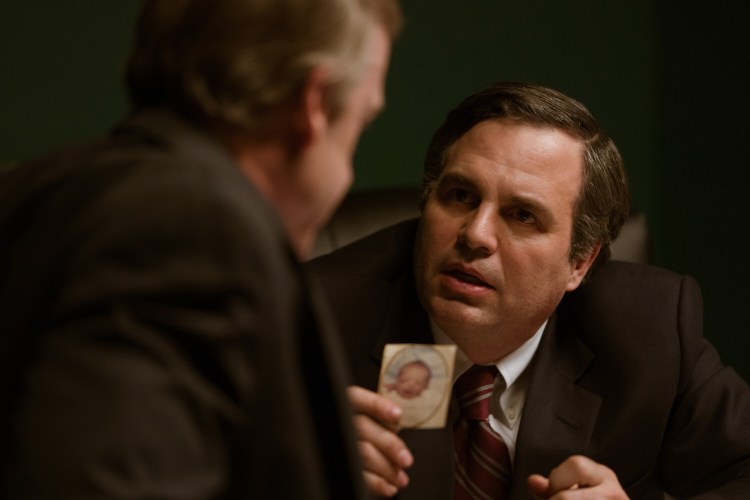Recipe for an omelet: Mix two eggs with a bit of milk, salt and pepper, add some onions if you like and maybe a few chopped veggies. Oh, be sure to add some polytetrafluoroethylene. You can shorten that to PFOA, and it won’t affect the taste. YOU, it will, but not the taste.
The true story behind Todd Haynes’ “Dark Waters” begins in Parkersburg, West Virginia, which is smack in the lap of DuPont Industries Industries’ chemical plants where DuPont Industries (make sure the children don’t read this) first produced the non-adhesive coating used in Teflon products. That would include the non-stick frying pan you are now using. Don’t worry, DuPont stopped using it in 2013, but there is some of it still in your body. Let me repeat: This is a true story, and one that is, in other states, other countries, other industries and other families, including yours, still going on.
Haynes’ film was adapted from a New York Times Magazine feature story by Nathaniel Rich, entitled “The Lawyer Who Became DuPont’s Worst Nightmare.” I remember reading that, but as time passed I, and probably you, were drowning in 2016’s Great Orange Wave.
This, in a petri dish, is what it’s all about.
In 1998, young corporation lawyer Rob Bilott (a calm Mark Ruffalo) receives a visit in his posh Cincinnati law firm office from a scrubby farmer, Wilbur Tennant (Bill Camp), a friend of his grandma, from Parkersburg, where, by the way, he grew up.
He arrives with a big stack of research and a horror story about how over 100 of his cattle have died horrible deaths, how his kids’ teeth have gotten black and he himself has developed cancer.
This is no Stephen King horror film, and it’s not fiction I must remind you; this is American history chemical pollution 101. Pay attention. This is about all of us, and it begins in 1975 when a group of kids go midnight swimming in a polluted local lake.
Bilott rejects the message, but is soon convinced after reading one of his kid’s books called “Funny Teeth.” Seriously. This will start a 20-year legal battle — not a solution, just a conclusion. The details in the credits will sicken you.
Bilott’s story, his investigation and climb through the muck and poisoning of Americans and the evil path of corporate malfeasance will threaten his career, his all-American family, and eventually, almost take his life. Haynes adds a touch of “All The President’s Men” with an underground parking lot moment where our hero is afraid to turn the key in his car.
You may start recalling, as I did, Haynes’ film “Safe,” another film that starred Carol White, a California suburban woman (Julianne Moore) who develops “Multiple Chemical Sensitivity or MCS, a stigmatized medical condition, in which the sufferer has recurrent multi-organ symptoms, when exposed to low doses of certain kinds of everyday chemicals.” That one scared me. This one enlarges the fear.
Ruffalo plays, as he did as the tenacious reporter in “Spotlight,” and the pit-bull detective chasing a serial killer in “Zodiac,” the quiet, questioning, smartest guy in the room. He will not stop, not after almost losing his wife, his life and his career. To make the point, Haynes ends the credits with Johnny Cash singing Tom Petty’s “I Won’t Back Down.”
The supporting cast of pros are perfect. Tim Robbins, as Tom Terp, Robert’s boss, will surprise you, both as character and performer.
Ann Hathaway, more mature in technique and fewer mannerisms these days, is saddled with the boring role of supportive wife … until she breaks.
But it’s the fabulous character actor Bill Camp, who plays Wilbur Tennant, the farmer, who, whenever he is on screen, delivers the sure-to-win Best Supporting Actor Oscar. His walk and talk, his pain-filled eyes and broken hands complete a cinematic version of Grant Wood’s “American Gothic” farmer, now fallen to his knees in despair.
Haynes’ “Dark Waters” has none of the subtly of his “Carol,” or complexities of “I’m Not There.” It is what it is, a stark, chilling indictment of the big chem criminals.
J.P. Devine, of Waterville, is a former stage and screen actor.
Comments are not available on this story.
Send questions/comments to the editors.



